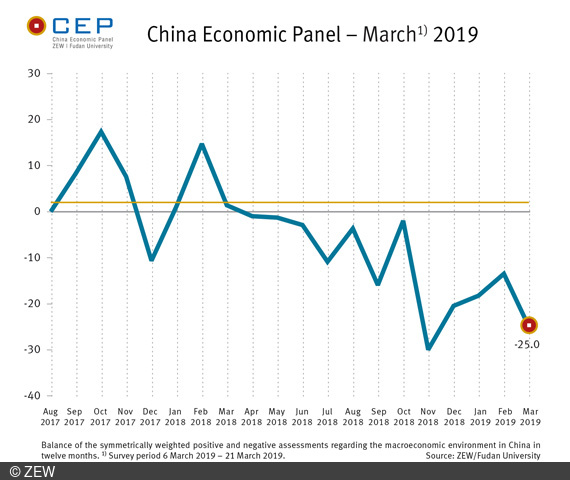Expectations for Chinese Economy Worsen
China Economic PanelCEP Indicator drops to a level of minus 25.0 points
According to the most recent survey for March (6–21 March 2019), the expectations regarding the Chinese economy have decreased significantly by 11.5 points. The CEP Indicator, which is based on the China Economic Panel and reflects the expectations of international financial market experts regarding China’s macroeconomic development over the coming twelve months, is currently at minus 25.0 points (February 2019: minus 13.5 points). This marks the twelfth month in a row that the CEP indicator has been below its long-term average.
The expectations for the current economic situation have remained almost unchanged, with the corresponding indicator dropping to a level of 13.9 points, 0.4 points below the previous month’s level.
With a value of 6.2 per cent, the point forecast for the Chinese real gross domestic product for 2019 has experienced a slight increase of 0.1 percentage points compared to the previous month. The experts’ point forecasts are thus in the middle of the target range of 6.0 to 6.5 per cent set by China’s Premier Li Keqiang at the National People’s Congress. The forecast for 2020, however, remains unchanged at 6.0 per cent.
As announced at the meeting of the National People’s Congress, China plans to increase government assistance for the economy through fiscal (e.g. by lowering the value-added tax) and monetary policy measures (e.g. by further cutting banks’ reserve requirement ratio).
“The expectations of the experts reflect the decisions made at the National People’s Congress. They expect to see a further rise in government consumption as well as an increase in domestic and foreign debt. The planned monetary policy measures are, in turn, reflected in the anticipated surge in stock prices,” says Dr. Michael Schröder, senior researcher in the Research Department “International Finance and Financial Management” at the ZEW – Leibniz Centre for European Economic Research and project leader of the CEP survey.
